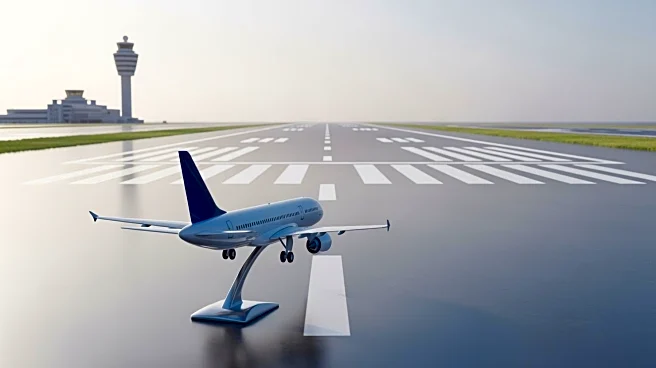What's Happening?
Delta Airlines is currently reducing its flight operations at 40 major U.S. airports in compliance with a directive from the Federal Aviation Administration (FAA) and the U.S. Department of Transportation.
This action is part of a broader effort to address air traffic control staffing shortages exacerbated by the ongoing government shutdown. As of November 9, 2025, Delta has completed all planned FAA-directed flight cancellations through November 11. The airline is experiencing additional delays and cancellations due to compounded constraints from air traffic control staffing shortages and weather-related issues. Delta has canceled over 320 mainline and 150 Delta Connection flights on November 9, with more expected. The airline is providing flexibility for customers to change, cancel, or refund their flights without penalty during this period.
Why It's Important?
The reduction in flights by Delta Airlines highlights the significant impact of air traffic control staffing shortages on the aviation industry. These shortages, linked to the government shutdown, are causing operational disruptions and affecting thousands of passengers. The situation underscores the critical role of air traffic controllers in maintaining safety and efficiency in the national airspace system. Airlines like Delta are forced to adapt by canceling flights and offering flexible options to passengers, which may lead to financial implications for the company and inconvenience for travelers. The broader aviation industry may face similar challenges, potentially affecting travel plans and economic activities reliant on air travel.
What's Next?
Delta Airlines is expected to continue monitoring the situation closely and make further adjustments to its flight schedule as necessary. The airline is committed to minimizing customer impact while prioritizing safety. Passengers are advised to check the Fly Delta app or delta.com for the latest information on their flights. Delta will provide notifications and rebooking options for affected customers. The resolution of the government shutdown and restoration of full air traffic control staffing levels will be crucial in returning to normal operations. Stakeholders, including government agencies and airlines, may need to collaborate to address the underlying issues and prevent future disruptions.
Beyond the Headlines
The ongoing flight reductions due to staffing shortages may prompt discussions about the resilience and preparedness of the aviation industry in handling such crises. It raises questions about the dependency on government operations and the need for contingency plans to ensure continuity in essential services. The situation may also lead to increased scrutiny of government policies affecting air traffic control staffing and funding. Long-term solutions could involve investments in technology and infrastructure to enhance the efficiency and reliability of air traffic management.









